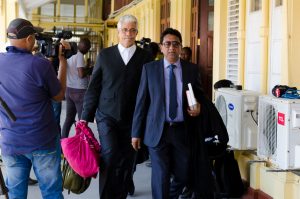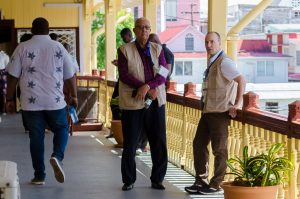(Guyana Chronicle) – Chief Justice, Roxane George-Wiltshire, will, today, rule whether the High Court has jurisdiction to hear an application intended to block the declaration of the results for the 2020 General and Regional Elections until the Region Four votes are completely verified.
Justice George-Wiltshire made the announcement on Saturday after hearing preliminary arguments in the case which was brought by People’s Progressive Party/Civic (PPP/C), through a private citizen Reeaz Holladar. Earlier the party had secured an injunction to block the Guyana Elections Commission (GECOM) from declaring the results for last Monday’s General and Regional Elections on the grounds that the votes declared for Region Four (Demerara-Mahaica) were not completely verified. The case was brought against the Region Four Returning Officer, Clairmont Mingo; the Chief Elections Officer, Keith Lowenfield; and the Guyana Elections Commission.

Holladar, who is also being represented by Anil Nandlall, is seeking a number of remedies including an order from the High Court that the declaration of the Region Four votes by the Returning Officer is in breach of the provisions of the Representation of the People’s Act and as such it is unconstitutional; and a declaration that GECOM cannot legally or constitutionally declare the results of the General and Regional Elections unless and until the Returning Officer or the Deputy Returning Officer for Region Four, complies with the process set out in Section 84 of the Representation of the People’s Act.
On Saturday, after a more than two-hour-long adjournment to allow for the filing of additional affidavits, the court case recommenced at 13:30hrs before Justice George-Wiltshire, under heightened security, with ranks of the Guyana Police Force stationed at strategic locations around the High Court in downtown Georgetown.

Engaging in a legal battle of words, Senior Counsel Neil Boston – the attorney representing GECOM, the Chief Elections Officer and the Region Four Returning Officer – argued that the High Court has no jurisdiction to hear the application which seeks to block the declaration of the results for the General and Regional Elections. Such a declaration has not been made but Trinidad’s Senior Counsel Douglas Mendes, who is among attorneys representing Holladar, argued that the court has jurisdiction to hear the case, emphasising that it is a matter of procedure and not the result. “That question can only be cited by an election petition, that is an election court and Justice Navindra Singh’s Court nor Madame Chief Justice’s Court is not an election court so they do not have jurisdiction to deal with it,” Boston submitted to the High Court.
In defending GECOM’s position, Boston argued that the application should have been brought before the High Court by way of an Election Petition within 28 days of the declaration of the overall results of the General and Regional Elections in keeping with Article 163 (1) of Constitution and the National Assembly Validity Elections Act.
According to Article 163 (1) of the Constitution, the High Court shall have exclusive jurisdiction to determine any question regarding the qualification of any person to be elected as a member of the National Assembly. Article 163 (1) (b) also grants the High Court exclusive jurisdiction to determine whether “(i) either generally or in any particular place, an election has been lawfully conducted or the result thereof has been or may have been, affected by any unlawful act or omission.”
The Senior Counsel submitted to Justice George-Wiltshire that the issues brought before the High Court fall “squarely” within Article 163 (1)(B)(i). An Election Petition, he stated, is mandated by Section 3 of the National Assembly Validity Elections Act.

Photos by Delano Williams
But while the National Assembly Validity Elections Act provides for an Election Petition to be brought before the High Court within 28 days of the official declaration of the General and Regional Elections results, Boston drew to the court’s attention the fact that the Elections Commission to date has not declared the results for the General and Regional Elections.
He argued that Holladar by questioning the process through which the results for Region 4 were arrived made the case, elections in nature, and as such should have awaited the official declaration before moving to the High Court. The Senior Counsel told the court that the Constitution and Elections Laws only envisage a one-stage process and not a two-stage process.
Holladar has argued that the process of verifying the Statements of Poll in the presence of party agents and observers were never completed, and as such the purported declaration of the votes by the Returning Officer is unlawful and of no effect. “[He is alleging] that the result for Georgetown which has been declared is affected by an unlawful act or omission and that falls within the teeth of the 163 (1) (B),” the Senior Counsel submitted to the Court.
In support of his arguments, the Senior Counsel referenced the case of N. P Punaswammy vs the Returning Officer in the state of Madras in 1952 and V. Sreekumar vs The Chief Electoral Officer on 24 March 2009 in Kerala, with similar grounds. Among the local cases referred to was Gladys Petrie and others vs the Attorney General and others in 1968 and most recently the case involving recalled Member of Parliament Charrandass Persaud whose seat in the National Assembly became the subject of a court matter on the grounds that he had breached the Constitution having sat in the Parliament as a Dual Citizen.
Elections petition
Meanwhile, Mendes, in his oral submissions, told the Court that the questions raised in Holladar’s application do not fall within Article 163 (1) of Constitution nor the National Assembly Validity Elections Act, and as such an election petition is not required.
“We respectfully submit that the questions raised do not fall within that class; the questions raised do not challenge the results of the elections because the results of the elections are not yet known; the questions raised do not challenge the election itself. What these proceedings seek to do is to progress the elections, to facilitate the elections in accordance with the law, irrespective of what the result might be,” Mendes submitted to the High Court.

He said his client’s application surrounds the electoral procedure to be followed and not the result of the General and Regional Elections. In making his case, the Trinidadian Senior Counsel referenced to Representation of the People Act, Section 83, sub section (9) (a). According to Section 83(1), “The presiding officer, as soon as practicable after the closing of the poll, in the presence of such of the persons entitled under section 79 (1) (b) to be present. Further to that, subsection 9, states “After the completion of the counting, the presiding officer shall complete the ballot paper account and tendered ballot paper account in Form 23, the Statement of Poll in Form 23 A, and prepare and certify a sufficient number of copies of the same for distribution as follows (a) to the returning officer; (b) to the assistant presiding officer; (c) to such of the duly appointed candidates or the polling agents as are present; (d) to the Chief Election Officer.”
Added to that, he said there is evidence that the process employed by the Returning Officer in tabulating 458 Statements of Poll (a percentage of the more than 800 SOPs) was flawed. “The process was not followed and it appears that the declaration was made under 84 (1) despite the fact that process was not followed. And what the applicant is asking this court to do; is direct that that process be followed. It is as simple as that,” Mendes said. The preliminary arguments in the case were heard in the presence of a number of International Observers including those from the Commonwealth, Carter Center, Organisation of American States and European Union Electoral Observation Missions.
